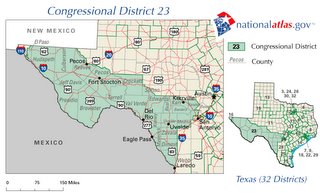Tony Tentative on Texas Test
I love alliteration. The Supreme Court heard oral arguments today in the Texas redistricting cases. My previous post runs down the issues. By the end of arguments today, I'd say that it's likely that much of the Texas district map will survive. There may be a small problem that the Court will correct though...
The part that Kennedy did seem hostile to involved District 23... It appears that District 23 was drawn to be maintain it as a "Hispanic district". However, the new lines took it from 63% Hispanic (of voting age) to about 51% Hispanic. Kennedy was offended by that because it removed a sizable chunk of a racial group, while trying to make it look like they were still in power. That Tom DeLay is one crafty fella, huh?
It appears that District 23 was drawn to be maintain it as a "Hispanic district". However, the new lines took it from 63% Hispanic (of voting age) to about 51% Hispanic. Kennedy was offended by that because it removed a sizable chunk of a racial group, while trying to make it look like they were still in power. That Tom DeLay is one crafty fella, huh?
In my previous post, I said that the key to winning this case would be to come up with a test that Justice Kennedy would accept. It doesn't seem like the challengers have done that here. The map will probably survive, minus the racial problems. I doubt that Kennedy will formulate his own test for these cases. I don't think that there will be a five vote majority in the Court to decide on a test either.
Because a number of the Justices -- including, notably, the potential swing voter, Justice Anthony M. Kennedy -- seemed troubled about the legislature's treatment of Latino voters in southwest Texas, that part of the "DeLay map" appeared to be in some trouble, perhaps necessitating some corrective that would affect adjoining districts, too, but not all 32 in the state.Typically, districts are drawn every ten years, after the results of the census are calculated. In this case, the Republican controlled Texas legislature redrew the lines in 2003. They claimed that the districts had been previously drawn in a way that favored Democrats too much. Democrats were overly represented in a heavily Republican state. Justice Kennedy did not seem to think that the off-year redrawing was necessarily a bad thing...
Kennedy suggested that it would be "very dangerous" if the Court were to take away from state legislatures the authority to reopen a districting plan that was found to be excessively partisan. Leaving open the option of drawing new districts within a single decade, he said, would act as "a control mechanism," with legislators on notice that if they "over-reached" in creating partisan advantage, that could be corrected.Kennedy seems to be in favor of letting the legislatures correct problems with the district lines, even multiple times in a single decade. Kennedy was also concerned about these so-called wrongly entrenched Democrats...
Kennedy elaborated a bit on the thought, suggesting that if an existing plan "freezes in Democrats, or party X," in a way that deviates noticeably from partisan registration in a state, that should not be left in place without a correction.He repeated his favor for legislative flexibility as opposed to judicial correction/supremacy...
He expressed concern that that was exactly what had happened in Texas, when a court-drawn plan favored Democrats while the state moved more toward a Republican voter majority. The "DeLay map" was, in fact, a GOP-driven response to a court-ordered plan.Ted Cruz, solicitor general of Texas (therefore arguing in support of the district map), made a strong Constitutional argument too...
...legislatures, not courts, should be the primary actors in redistricting. If that primary responsibility were shifted to courts, he said, it would create "an incentive for every minority party to deadlock the system" in the legislature, leading the courts to step in and put into place their own preferences about redistricting.These arguments are often hit or miss. The ones that hit are usually ones like this. The justices do not want to have a huge public policy mess on their hands. They certainly don't want to be deciding district lines for years to come.
The part that Kennedy did seem hostile to involved District 23...
 It appears that District 23 was drawn to be maintain it as a "Hispanic district". However, the new lines took it from 63% Hispanic (of voting age) to about 51% Hispanic. Kennedy was offended by that because it removed a sizable chunk of a racial group, while trying to make it look like they were still in power. That Tom DeLay is one crafty fella, huh?
It appears that District 23 was drawn to be maintain it as a "Hispanic district". However, the new lines took it from 63% Hispanic (of voting age) to about 51% Hispanic. Kennedy was offended by that because it removed a sizable chunk of a racial group, while trying to make it look like they were still in power. That Tom DeLay is one crafty fella, huh?In my previous post, I said that the key to winning this case would be to come up with a test that Justice Kennedy would accept. It doesn't seem like the challengers have done that here. The map will probably survive, minus the racial problems. I doubt that Kennedy will formulate his own test for these cases. I don't think that there will be a five vote majority in the Court to decide on a test either.